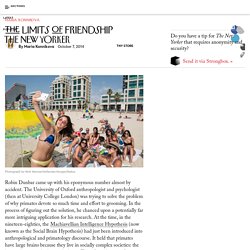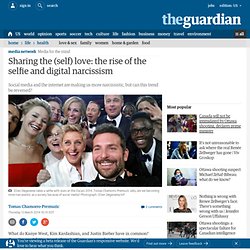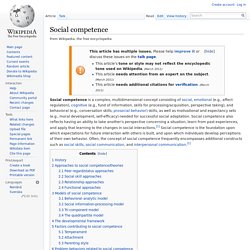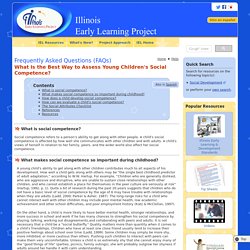

The Limits of Friendship. Robin Dunbar came up with his eponymous number almost by accident.

The University of Oxford anthropologist and psychologist (then at University College London) was trying to solve the problem of why primates devote so much time and effort to grooming. In the process of figuring out the solution, he chanced upon a potentially far more intriguing application for his research. At the time, in the nineteen-eighties, the Machiavellian Intelligence Hypothesis (now known as the Social Brain Hypothesis) had just been introduced into anthropological and primatology discourse. It held that primates have large brains because they live in socially complex societies: the larger the group, the larger the brain.
Thus, from the size of an animal’s neocortex, the frontal lobe in particular, you could theoretically predict the group size for that animal. Looking at his grooming data, Dunbar made the mental leap to humans. The Dunbar number is actually a series of them. Are social Networking Sites Replacing Real Life Socialising? There is a statement by famous sociologist Emile Durkheim that “Man cannot live without attachment to some object which transcends and survives him”.

Man needs a social networking life. He needs a network where he can share his thoughts, feelings etc. Today’s life is so busy that people even don’t get time to say hello to their neighbors. Everybody is busy with their own lifestyle. Now days, social networking has become online rather than offline. In a research it is shown that 46% of people spend 3-4 hours browsing through other people’s profile pages on various social networking sites.
There are many social networking sites like Facebook, Orkut, Twitter, Linkedin, Google + etc. Image credit : Buzzfeed.com. Selfie (TV Series 2014– ) Sharing the (self) love: the rise of the selfie and digital narcissism. What do Kanye West, Kim Kardashian, and Justin Bieber have in common?

Grandiose exhibitionism, inflated self-views, superficial personalities and shameless self-promotion. In that sense, they are just like millions of their Facebook and Twitter fans around the world, except successful. Welcome to the age of digital narcissism, a world of endless ostentation opportunities and unlimited bragging possibilities. Showing-off has never been easier and, ironically, more celebrated. Until the 90s, the media provided an escape from reality by transporting consumers to the fictional universe of sitcoms, soap operas and series.
It is noteworthy that digital exhibitionism and inappropriate self-disclosure have been at the core of every mega-successful app and website. Unsurprisingly, narcissism levels have been rising for decades. Needless to say, most social media users are not narcissistic. Perhaps it is time to turn social media into a therapeutic tool, at the service of the public and society. Social competence. Social competence is a complex, multidimensional concept consisting of social, emotional (e.g., affect regulation), cognitive (e.g., fund of information, skills for processing/acquisition, perspective taking), and behavioral (e.g., conversation skills, prosocial behavior) skills, as well as motivational and expectancy sets (e.g., moral development, self-efficacy) needed for successful social adaptation.

Social competence also reflects having an ability to take another's perspective concerning a situation, learn from past experiences, and apply that learning to the changes in social interactions.[1] Social competence is the foundation upon which expectations for future interaction with others is built, and upon which individuals develop perceptions of their own behavior.
Often, the concept of social competence frequently encompasses additional constructs such as social skills, social communication, and interpersonal communication.[1] History[edit] Peer regard/status approaches[edit] FAQs. Assessing Children’s Social Competence. What is social competence?

Social competence refers to a person’s ability to get along with other people. A child’s social competence is affected by how well she communicates with other children and with adults. A child’s views of herself in relation to her family, peers, and the wider world also affect her social competence. What makes social competence so important during childhood? A young child’s ability to get along with other children contributes much to all aspects of his development.